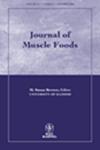COMPARISON OF PROTEIN, LIPID AND FATTY ACIDS COMPOSITION OF ANCHOVY (ENGRAULIS ENCRASICOLUS L. 1758) DURING THE COMMERCIAL CATCHING SEASON
Abstract
ABSTRACT
In this research were investigated protein, lipid and fatty acids contents of commercially important anchovy (Engraulis encrasicolus) during the catching season. The protein content of anchovy ranged from 17.24 to 16.94%. The lipid content of anchovy was maximum (18.57%) in November and minimum (15.57%) in January The total saturated fatty acids content were determined as 38.62, 35.20 and 33.57% in November, December and January, respectively. Palmitic acid (C16:0) was found at the highest levels among the saturated fatty acids through all commercial catch season. The monounsaturated fatty acids content ranged from 25.45 to 29.50%. Concerning the monounsaturated fatty acids, oleic acid (C18:1n-9) constituted the larger percentage than others. Docosahexaenoic acid (DHA; C22:6n-3) and eicosapentaenoic acid (EPA; C20:5n-3) contents were determined as average 9.37% and 7.92%, respectively. n-3 Polyunsaturated fatty acids (n-3 PUFAs) of anchovy were higher than n-6 PUFAs. Thrombogenicity and atherogenicity index values were 0.43, 0.40, 0.36 and 1.94, 1.69, 1.52 in November, December and January, respectively. The n-6/n-3 ratio of anchovy was 0.23, 0.20 and 0.17 in November, December and January, respectively.
PRACTICAL APPLICATIONS
The anchovy is very important a fish for Turkey. Annual per capita fish consumption is around 8 kg in Turkey, which 40% is anchovy. This research provides useful information on the proximate composition of anchovy during the catching season. Results of this research will be reference for the fish processing technology, dieticians and similar academic studies.

 求助内容:
求助内容: 应助结果提醒方式:
应助结果提醒方式:


